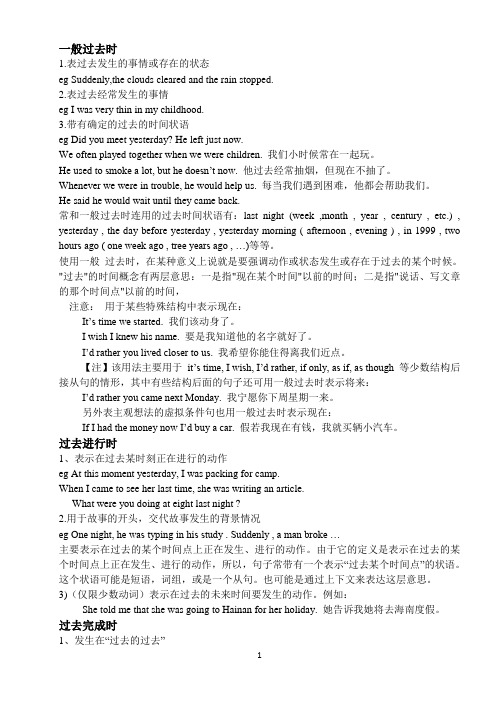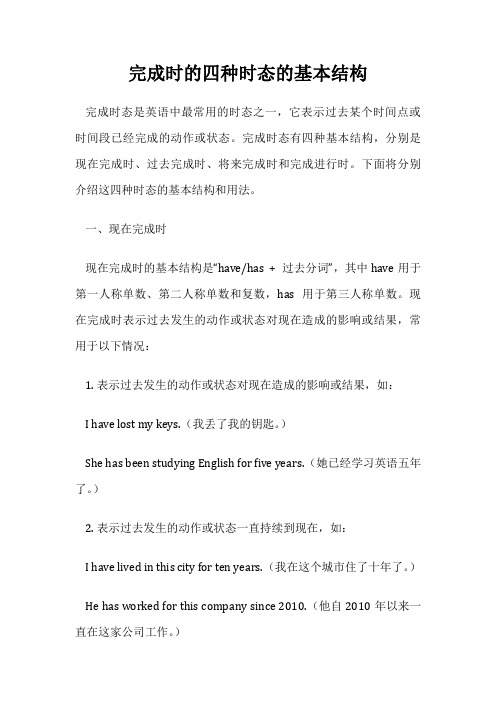英语中过去完成时和过去完成进行时区别用法
- 格式:doc
- 大小:35.00 KB
- 文档页数:2

过去完成时和过去完成进行时都表示过去的动作,但是它们的用法和格式有很大不同。
一、过去完成时描述一件发生在过去且在过去完成的动作,更重要的是它表明在过去一件事发生在另一件事之前,格式为had + 动词的过去分词,例如:He had saved the document before the computer crashed.他在电脑死机前保存了文件。
解析:此句有crashed 和saved 两个过去动作,saved 发生在crashed 之前,且动作已经完成,所以saved 用过去完成时。
He had cooked breakfast when I got up.我起床时他做了早餐。
解析:此句有got up 和cooked 两个过去动作,cooked 发生在got up 之前,且动作已经完成,所以cooked 用过去完成时。
I recognized her because I had seen her on TV.我认出她是因为我在电视上见过她。
解析:此句有recognized 和seen 两个过去动作,seen 发生在recognized 之前,且动作已经完成,所以seen 用过去完成时。
He had lost consciousness by the time the ambulance reached the hospital.当救护车到达医院时,他已经失去了知觉。
解析:此句有reached 和lost 两个过去动作,lost 发生在reached 之前,且动作已经完成,所以lost 用过去完成时。
二、过去完成进行时描述一件发生在过去且一直持续到过去的某个时间的动作,只能用延续性动词,格式为:had + been + 动词的现在分词形式,例如:She had been waiting for more than one hour when her friends finally arrived.她等了一个多小时,朋友们终于来了。

小学五年级关于时态的英语语法介绍最新12篇(经典版)编制人:__________________审核人:__________________审批人:__________________编制单位:__________________编制时间:____年____月____日序言下载提示:该文档是本店铺精心编制而成的,希望大家下载后,能够帮助大家解决实际问题。
文档下载后可定制修改,请根据实际需要进行调整和使用,谢谢!并且,本店铺为大家提供各种类型的经典范文,如工作报告、总结计划、心得体会、演讲致辞、策划方案、合同协议、条据文书、教学资料、作文大全、其他范文等等,想了解不同范文格式和写法,敬请关注!Download tips: This document is carefully compiled by this editor. I hope that after you download it, it can help you solve practical problems. The document can be customized and modified after downloading, please adjust and use it according to actual needs, thank you!Moreover, our store provides various types of classic sample essays, such as work reports, summary plans, insights, speeches, planning plans, contract agreements, documentary evidence, teaching materials, complete essays, and other sample essays. If you would like to learn about different sample formats and writing methods, please pay attention!小学五年级关于时态的英语语法介绍最新12篇英语时态是语法的一个难点,也是我们学习的重点。

一般过去时1.表过去发生的事情或存在的状态eg Suddenly,the clouds cleared and the rain stopped.2.表过去经常发生的事情eg I was very thin in my childhood.3.带有确定的过去的时间状语eg Did you meet yesterday? He left just now.We often played together when we were children. 我们小时候常在一起玩。
He used to smoke a lot, but he doesn’t now. 他过去经常抽烟,但现在不抽了。
Whenever we were in trouble, he would help us. 每当我们遇到困难,他都会帮助我们。
He said he would wait until they came back.常和一般过去时连用的过去时间状语有:last night (week ,month , year , century , etc.) , yesterday , the day before yesterday , yesterday morning ( afternoon , evening ) , in 1999 , two hours ago ( one week ago , tree years ago , …)等等。
使用一般过去时,在某种意义上说就是要强调动作或状态发生或存在于过去的某个时候。
"过去"的时间概念有两层意思:一是指"现在某个时间"以前的时间;二是指"说话、写文章的那个时间点"以前的时间,注意:用于某些特殊结构中表示现在:It’s time we star ted. 我们该动身了。
I wish I knew his name. 要是我知道他的名字就好了。

完成时的四种时态的基本结构完成时态是英语中最常用的时态之一,它表示过去某个时间点或时间段已经完成的动作或状态。
完成时态有四种基本结构,分别是现在完成时、过去完成时、将来完成时和完成进行时。
下面将分别介绍这四种时态的基本结构和用法。
一、现在完成时现在完成时的基本结构是“have/has + 过去分词”,其中have用于第一人称单数、第二人称单数和复数,has用于第三人称单数。
现在完成时表示过去发生的动作或状态对现在造成的影响或结果,常用于以下情况:1. 表示过去发生的动作或状态对现在造成的影响或结果,如:I have lost my keys.(我丢了我的钥匙。
)She has been studying English for five years.(她已经学习英语五年了。
)2. 表示过去发生的动作或状态一直持续到现在,如:I have lived in this city for ten years.(我在这个城市住了十年了。
) He has worked for this company since 2010.(他自2010年以来一直在这家公司工作。
)3. 表示过去发生的动作或状态与现在有关联,如:I have just finished my homework.(我刚刚完成了我的作业。
)She has already left for the airport.(她已经去机场了。
)二、过去完成时过去完成时的基本结构是“had + 过去分词”,表示在过去某个时间点或时间段之前已经完成的动作或状态。
过去完成时常用于以下情况:1. 表示过去某个时间点或时间段之前已经完成的动作或状态,如:I had finished my work before he arrived.(他到达之前我已经完成了我的工作。
)She had lived in Paris for two years before she moved to London.(她在搬到伦敦之前在巴黎住了两年。

一般过去时、过去完成时和过去进行时的区别在学习英语语法时,有一些时态往往容易让人感到困惑,比如一般过去时、过去完成时和过去进行时。
这三种时态在使用上有着明显的区别,通过正确的理解和掌握,可以更准确地表达过去发生的事件和动作。
一般过去时一般过去时用来描述过去的某个时间点或时间段内发生的习惯性、经常性或一次性的动作或事件。
在构成上,一般过去时通常是在动词原形后加上了-ed或者是过去式的形式。
比如,动词”go”的一般过去时形式是”went”,动词”work”的一般过去时形式是”worked”。
例句:•I went to the supermarket yesterday.•She studied English when she was in college.•They played football every Sunday.在以上例句中,一般过去时被用来描述过去某个具体的时间发生的动作,强调的是动作的完成,不涉及到其他时态的关系。
过去完成时过去完成时用来表示在过去某个时间点或时间段之前已经发生或完成的动作。
过去完成时由had加动词的过去分词构成。
这种时态常常用在两个已经发生的动作中,强调发生在过去某个时间点之前的动作。
例句:•When I arrived at the party, they had already left.•She had finished her homework before dinner.•By the time we got to the cinema, the movie had started.在以上例句中,过去完成时指明了在过去某个时间点之前已经完成的动作,通过这种时态可以清晰地表达出事件之间的先后顺序。
过去进行时过去进行时用来描述在过去某个具体时间或时间段内正在进行的动作。
过去进行时由was/were加动词的ing形式构成。
这种时态强调了动作或事件发生时正在进行的状态。

过去时态的构成与用法过去时态是英语中常用的时态之一,用来表达过去发生的动作、情况或状态。
本文将探讨过去时态的构成和用法。
一、过去时态的构成过去时态的构成相对简单,一般有三种形式:简单过去时、过去进行时和过去完成时。
1. 简单过去时简单过去时用于表示过去某个时间或期间的动作、情况或状态。
一般根据动词的不同,构成规则如下:a) 对于大多数动词,直接在动词原形后加上-ed即可,如:- play → played- call → calledb) 对于以辅音字母+y结尾的动词,则将y改为i,再加-ed,如:- study → studied- try → triedc) 以“辅音字母+元音字母+辅音字母”结尾的重读闭音节动词,双写末尾的辅音字母,再加-ed,如:- stop → stopped- plan → plannedd) 以不发音的-e结尾的动词,直接加-d,如:- dance → danced- love → loved2. 过去进行时过去进行时用于表示过去某个时间点或期间正在进行的动作。
构成规则为:was/were + 动词-ing,如:- I was reading a book when she called me.- They were playing soccer at the park yesterday evening.3. 过去完成时过去完成时用于表示过去某个时间点或期间之前已经完成的动作。
构成规则为:had + 过去分词,如:- He had finished his homework before he went to bed.- We had already eaten dinner when the guests arrived.二、过去时态的用法过去时态广泛应用于口语和书面语中,以下是常见的几种用法:1. 表示过去的动作或情况过去时态最基本的用法是用于描述过去发生的动作、情况或状态,如:- She lived in London for five years.(她在伦敦生活了五年。
英语中现在完成时和现在完成进行时怎么区分,过去完成时和过去完成进行时又该怎
么区分?
这个问题解决不难。
你要记住以下几点即可。
1,凡是用进行时的,肯定是要突出动作正在发生中,否则就不要用进行时。
比如,I have lived here for 5 years和I have been living here for 5 years。
这两句都很常见,区别就在于,前一句只是说明到现在为止已经完成的状态,但不知道说话时,这个动作是否还在进行。
而后一个句子不仅说到目前完成的状态,还强调在说话时动作还在进行中。
2,现在完成时和过去完成时的区别。
在做时态题目时,要看两点,一是句子当中明确给出的时间,比如看到了in the past +时间,我们一般就用现在完成时。
例如,in the past ten years, English has been taught in a new way in this school。
其次要看句子中别的动词用哪种时态,然后对比两个动词的发生顺序。
比如,English had been taught for 6 minutes when I arrived。
此句,当我到达的时候,英语已经上了6分钟了。
teach和arrive的发生有个顺序。
过去完成时知识点归纳与总结一、过去完成时的构成过去完成时是由助动词"had"和动词的过去分词形式构成的。
动词的过去分词形式通常是在动词原形后加上-ed。
例如:"had seen","had eaten"。
二、过去完成时的用法1. 表示在过去某个时间或动作之前已经发生或完成的动作。
例如:"She had already left when I called her."意思是"在我给她打电话的时候,她已经离开了。
"2. 表示过去某个时间点之前一直持续的动作或状态。
例如:"I had known him for years before he moved away."意思是"在他搬走之前,我认识他已经有很多年了。
"3. 表示对过去某个动作的猜测或假设。
例如:"He had probably gone to bed when I arrived."意思是"当我到达时,他可能已经上床睡觉了。
"4. 与"if only"连用,表示对过去某个动作的遗憾或后悔。
例如:"If only I had studied harder, I would have passed the exam."意思是"要是我当时学得更努力一些,我就能通过考试了。
"三、过去完成时的标志词过去完成时的常见标志词有:"already","just","before","when","after","by the time","until"等。
四、过去完成时与其他时态的区别1. 过去完成时与一般过去时的区别:过去完成时表示在过去某个时间或动作之前已经发生或完成的动作,强调先后顺序;而一般过去时则仅表示过去的动作或状态,没有先后顺序的含义。
中考英语过去完成时、过去进行时过去将来时、时态一致原则1过去完成时规则动词的过去分词和它的过去式相同;不规则动词的过去分词需要特殊记住。
构成had doneHe had brushed teeth before he had breakfast.By the end of last month they had finished the work.23过去现在现在完成时过去完成时现在过去过去的过去过去完成时表示在过去之前已经完成的动作,即“过去的过去”。
4过去完成时表示一个动作或状态在过去某一动作之前已经完成或结束。
He before I . She me that she a new novel.had left arrivedtold had written现在过去过去的过去5现在过去过去的过去过去完成时表示某一动作或状态在过去某时之前已经开始,一直延续到这一过去时间,而且动作尚未结束,仍然有继续下去的可能。
By , my father here for two years. By , he eleven hours.the end of last year ten o'clock last night had lived had workedI have had dinner.×I had had dinner.I had had dinner before I went for a walk.I had had dinner before 8 o'clock last night.过去完成时是一个相对的时态,表示的是“过去的过去”,只有和过去某一时间或某一动作相比较,并且发生在其之前时才能使用。
6过去进行时构成was/were doingI watched TV last night.I was watching TV at 9 o'clock last night.I was watching TV when you knocked at the door.7表示过去某个时刻正在发生的动作。
过去完成时和过去完成进行时
过去完成进行时(Past Perfect Progressive Tense)
过去完成式是不能单独用的。
我们用的时候,必须有另一个事件。
也就是说,假如我们有两件事A 和B,两件事都发生在过去,但A 发生在B 以前,A 应该用过去完成式,B 则用过去式。
以下是几个例子:
(1)他到台湾以前,曾学过中文。
He had studied Chinese before he came to Taiwan.
(2)他念大学以前,曾前工作过。
He had worked before he decided to go to college.
(3)我写这篇有关爱尔兰的小说以前,曾去过爱尔兰。
I had been to Ireland before I wrote this book about Ireland's people.
(4)我在上大学以前,已经学过微积分。
I had studied calculus before I got into college.
(5)周一以前,已经下过雪了。
It had already snowed before Monday.
(6)警察到来之前,小偷已经跑了。
When the police arrived, the thieves had already run away.
(7)到那时,他的家人已经有半年没有他的消息了。
Until then, his family hadn’t heard from him for 6 months.
如果我们要强调较早发生事件的连续性,我们可以用过去完成进行式。
占去完成进行式和现在进行式惟一不同的地方是verb to have 的地方一定要用had 。
以下是一些过去完成进行式的例子:
1. I had been watching TV before you called me.
2. I had been working hard in a company for many years before I went to college.
3. He had been studying before he went to class.
4. He had been driving all day before he went to sleep.
过去完成时
1)概念:表示过去的过去
----|-------|-----|---->其构成是had +过去分词构成。
那时以前那时现在
2)用法
a. 在told, said, knew, heard, thought等动词后的宾语从句。
She said (that) she had never been to Paris.
b. 状语从句
在过去不同时间发生的两个动作中,发生在先,用过去完成时;发生在后,用一般过去时。
When the police arrived, the thieves had run away.
c. 表示意向的动词,如hope, wish, expect, think, intend, mean, suppose等,用过去完成时表示"原本…,未能…"
We had hoped that you would come, but you didn't.
3) 过去完成时的时间状语before, by, until , when, after, once, as soon as。
He said that he had learned some English before.
By the time he was twelve, Edison had began to make a living by himself.
Tom was disappointed that most of the guests had left when he arrived at the party.
过去完成进行时形式:
I (or You,He,John,They,Those men)had been studying.
770 过去完成进行时与过去完成时的用法很相近,它通常表示一个持续到过去某时的动作:
He had been waiting for two weeks.He was still waiting.(有一个表示一段时间的状语)
Up to that time he had been translating those books.(He was still translating at “that time”.)
He had been writing the letter till two o'clock.
He was now thirty years old.He had been gambling since he was ten.(He was still gambling at thirty.)
He had been standing there in the sun.(没有时间状语)
He had been thinking about his marriage.
不过这个时态并不一定表示这个过去动作将持续下去:
He came back at seven.He had been waiting for her two hours.(At seven he did not wait any more.)
He stopped swimming.He had been swimming for the last three hours.
另一方面,这个时态也和现在完成进行时一样,也可有一些特别的含义:
1)尚未完成:
He had been writing the novel.(He had not finishedit yet.)
2)企图:
He had been studying the meaning of this proverb.(He was trying to study it.)
3)未得结果:
We had been studying what our enemy had said.(But we were not able to understand it.)
4)最近情况:
He had been quarrelling with his wife.(lately)
5)反复动作:
He had been asking me the same question.(Many times)
6)情绪:
What had he been doing?(不耐烦)
这个时态很少用在否定句中,而多以过去完成时代替:
He had not practised English for many years.(普通说法)
He had not been practising English for many years.(少见)
这个时态还可用在said,supposed等引起的间接引语中,代替现在完成进行时:
He said,“I have been speaking to John.”=He said that he had been speaking to John.
He thought,“She was watching me when I passed.”=He thought that she had been watching him when he had passed.
练习翻译句子
1.当他到达晚会时,他发现大多数客人已经离开了。
Most of the guests had left when he arrived at the party.
2.火车开出前,我们就已经到达火车站了。
We had gotten to the station before the train left.
3.我们到电影院太晚了,电影已经开始了。
We arrived at the cinema late. The film had already begun.
4.她很兴奋,因为她从来没有坐过飞机。
She was very excited. She had never flown before.
5.我到家时,她已经睡觉了。
By the time I got home, she had already gone to bed.。